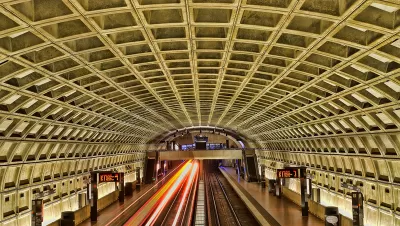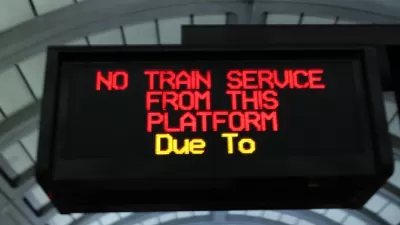Unless D.C. Metro abides by the Federal Transit Administration safety directives issued Saturday and takes "urgent action," they threatened to shut down all or parts of the system, the nation's second busiest subway after New York's.

The FTA took the unprecedented step after "citing Metro’s botched response to Thursday’s fire at the Federal Center SW station, reports Robert McCartney of The Washington Post, despite Metro General Manager Paul Wiedefeld closing the station Thursday afternoon after the second incident, apparently not soon enough.
In its toughest measures since it took over direct safety oversight of Metro in October, the FTA ordered daily inspections for “hot spots” and water leaks along tracks, as well as reductions in the number of railcars in service and slower speeds for trains so less power is used....[plus more orders].
The four-page directive [PDF] lambastes Metro employees for placing a higher priority on keeping trains running than on safety, especially in what the FTA called their “slow and inadequate” response to two smoke and fire events Thursday at Federal Center SW.
On Friday, Metro had announced an overhaul plan that will, in fact, shut down parts of the system, "inconvenienc(ing) nearly everyone who uses the system," wrote McCartney with Paul Duggan and Lori Aratani on May 6.
See the Washington Post video below, describing the year-long overhaul plan called "SafeTrack," starting next month, that affects all lines except Silver Line which opened phase 1 in July 2014.
Faulty cables and connector assemblies have been implicated in several electrical malfunctions that have ignited Metro track fires. In one such incident, on Jan. 12, 2015, when smoke filled a tunnel near the L’Enfant Plaza station, the fumes enveloped a stalled train, killing one rider and sickening dozens of others.
"The National Transportation Safety Board (NTSB) said the smoke in the L’Enfant Plaza incident was caused by electrical arcing, which occurs when electricity escapes its prescribed path," notes The Post in a pictorial article updated in March illustrating Metro's electrical woes. " Arcing problems have bedeviled Metro, particularly in areas that have water leaks."
On Friday, NPR also covered the year-long repair effort with a radio interview of Metro General Manager Paul Wiedefeld by transportation reporter Martin DiCaro of member station WAMU.
"Given Metro’s efforts, [Metro Board Chairman Jack] Evans said, he thought it was unlikely that the FTA would take the unprecedented step of shutting down service to punish Metro for failing to follow the federal directives," adds McCartney. Evans is also a D.C. Council member.
Finally, Metro's woes did not escape one reporter who got to ask the last question at President Obama's press conference on the economy on Friday. Noting that the president "will soon be a more ordinary district resident," he asked the president what he thought of the March 16 shutdown of Metro due to safety-related problems and "what can your administration do if Republicans are standing in the way of an infrastructure bill specifically for Metro funding?"
McCartney and David Nakamura provide the answer as well as the video in The Post's Dr. Gridlock column.
“It is just one more example of the under-investments that have been made,” Obama, who plans to remain in Washington for at least two years after he leaves the White House, said in response to a reporter’s question about the subway. “Look, the D.C. Metro historically has been a great strength of this region, but over time we under-invested in maintenance and repair.”
He did not offer any specific tactic he would take in response to potential Republican obstruction, nor did he "offer any new proposals to help provide funding for Metro," note McCartney and Nakamura.
As a recent post comparing Metro's woes to those of its two siblings in the Bay Area and Atlanta indicates, both BART and MARTA go to the voters in their districts to raise tax revenue, something Metro has never done, making it "unique among big U.S. transit systems." The funding shortfall is covered by contributions from the District of Columbia, Maryland, and in Virginia: Arlington, Alexandria, Fairfax, Fairfax County, and Falls Church, according to the Washington Metropolitan Area Transit Authority.
Hat tip to Kenyon F. Karl via Sierra Club Transportation Forum.
FULL STORY: Federal agency orders new safety steps after Metro’s handling of Thursday fire

Study: Maui’s Plan to Convert Vacation Rentals to Long-Term Housing Could Cause Nearly $1 Billion Economic Loss
The plan would reduce visitor accommodation by 25,% resulting in 1,900 jobs lost.

North Texas Transit Leaders Tout Benefits of TOD for Growing Region
At a summit focused on transit-oriented development, policymakers discussed how North Texas’ expanded light rail system can serve as a tool for economic growth.

Why Should We Subsidize Public Transportation?
Many public transit agencies face financial stress due to rising costs, declining fare revenue, and declining subsidies. Transit advocates must provide a strong business case for increasing public transit funding.

How Community Science Connects People, Parks, and Biodiversity
Community science engages people of all backgrounds in documenting local biodiversity, strengthening connections to nature, and contributing to global efforts like the City Nature Challenge to build a more inclusive and resilient future.

Alabama: Trump Terminates Settlements for Black Communities Harmed By Raw Sewage
Trump deemed the landmark civil rights agreement “illegal DEI and environmental justice policy.”

Dear Tesla Driver: “It’s not You, It’s Him.”
Amidst a booming bumper sticker industry, one writer offers solace to those asking, “Does this car make me look fascist?”
Urban Design for Planners 1: Software Tools
This six-course series explores essential urban design concepts using open source software and equips planners with the tools they need to participate fully in the urban design process.
Planning for Universal Design
Learn the tools for implementing Universal Design in planning regulations.
City of Santa Clarita
Ascent Environmental
Institute for Housing and Urban Development Studies (IHS)
City of Grandview
Harvard GSD Executive Education
Toledo-Lucas County Plan Commissions
Salt Lake City
NYU Wagner Graduate School of Public Service




























